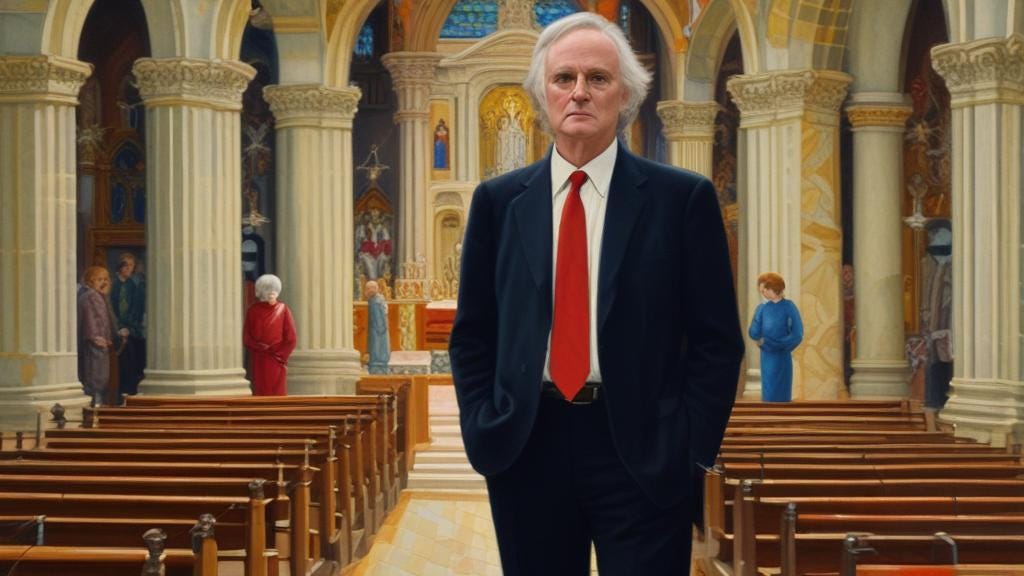Cultural Christianity without Christ?
Why Richard Dawkins cannot sustain his cultural Christianity without faith in Christ.
There has been a lot of commentary on Richard Dawkins’ coming out as a “cultural Christian.”
The problem is that Dawkins wants Christianity to sustain his culture and civilization even as he mocks it and berates it for its alleged superstitious absurdities.
But ethics based on biology, evolutionary biology no less, will not give you the love command of Jesus, nor attribute value to the vulnerable and oppressed. This was Nietzsche’s insight, Christianity is a putrid religion because it glories in shame, it worships the victim not the victor, it lifts up the weak instead of putting them down, and it desires compassion rather than oppression.
Writing for The Sunday Times, Glenn Scrivener hits the nail on the head when he writes:
Dawkins speaks with assurance about “decency” and “ethos”. Press in. These values are not biological but they are no less real for that. There is reality, perhaps the deepest reality, to the super-natural — to that which is above nature, that which inverts the survival of the fittest. There is compassion for “the weak, the low, the botched” and the Christian claim is that following this love to its source brings us face to face with a person — not an idea, a feeling or an energy. Jesus transcends biological necessity. On the Cross he transcends it morally, in the resurrection he transcends it physically. It’s Easter that heals the Split.
My question for Dawkins is “What are the symbols for ‘Mercy’ and ‘Compassion’ on the periodic table?”
The ethics he cherishes cannot be derived from the natural world, he thus needs something extra-natural or super-natural to sustain it, precisely what he does not possess!
To read further, consider joining the “Aviary” by taking out a paid subscription, only $7 per month or $75 per year, supports me in my ministry and scholarship, and gets you 3-4 posts per week on biblical studies, Christianity and gender relationships, cultural commentary, book reviews, previews of my forthcoming books, and some cool videos.
The natural world deals with description, not prescription, there is how things happen, but no moral legislation that nature and the universe is bound by.
In a godless universe, there is no cosmic moral compass, no right and wrong, only that which takes whatever the consequences are for living and non-living organisms. In other words, the natural world has an “is” but no “ought,” there is no way things ought to be. For there are no moral laws written into nature, nothing ethical inscribed onto the rings of Saturn, no commandments seen in the arrangement of the stars. Nature is amoral, it doesn’t care if you help an old lady take out her garbage or throw her in front of a bus.
In the absence of objective moral values, a moral universe in which our agency and actions are meaningful, all ethics are either aesthetics (things we like) or the altruism of survival (things we do or don’t do to help ourselves individually and collectively to survive).
Dawkins knows this and he himself has said: “Nature is not cruel, only pitilessly indifferent. This is one of the hardest lessons for humans to learn.”
But nobody can live that way! Neither does Dawkins, he knows it, but doesn’t want to embrace the reality that a morally meaningless universe creates.
One could go with Immanuel Kant and regard God as a necessary postulate for the highest good, a standard of goodness that humans can measure themselves by and aspire towards.
The problem is that this postulation of God seems to have a little bit of pretending about it.
And sooner or later someone is going to say, “I’m not pretending. Let’s ditch the Nazarene and go with Nature and Nietzsche.” Then, eventually, you get an Adolf Hitler who says, “I do not see why man should not be just as cruel as nature.”
But perhaps Theism is more than a necessary postulate, maybe Jesus Christ is not a myth, it could be the case that the resurrection shows us the goodness of God’s power and the power of his goodness, of which the implication is that goodness is real, just as real as evil, as the resurrection is God’s reply to the chaos, carnage, and cruelty of the natural and supernatural world.
I’d rather believe that than the alternative.





Seems to me that there is considerable overlap in ideas between Steven Wolfe's Christian Nationalism (coming from a theistic viewpoint) and Richard Dawkins cultural Christianity (coming from an atheistic viewpoint). Both like the points where Christian assumptions support their preferences /intuitions for the common good. But both seem to miss the point that cruciformity - Jesus on the cross, God's power through weakness, sacrificial non-coercive love - and voluntary allegiance to that reality - is essential to maintaining the power and efficacy of those assumptions. You can't take out the pieces you like and hope enough others share your emotional preference for them (Dawkins) or try to coerce the bits you like from those who don't share the allegiance (Wolfe) and think that you can create anything stable for the common good.
You packed a lot into this one, Michael. Excellent.